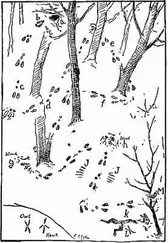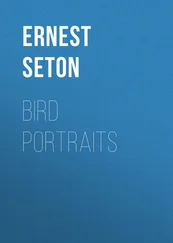Ernest Seton - Rolf in the Woods
Здесь есть возможность читать онлайн «Ernest Seton - Rolf in the Woods» весь текст электронной книги совершенно бесплатно (целиком полную версию без сокращений). В некоторых случаях можно слушать аудио, скачать через торрент в формате fb2 и присутствует краткое содержание. Год выпуска: 1997, Жанр: Приключения про индейцев, Исторические приключения, на английском языке. Описание произведения, (предисловие) а так же отзывы посетителей доступны на портале библиотеки ЛибКат.
- Название:Rolf in the Woods
- Автор:
- Жанр:
- Год:1997
- ISBN:нет данных
- Рейтинг книги:3 / 5. Голосов: 1
-
Избранное:Добавить в избранное
- Отзывы:
-
Ваша оценка:
- 60
- 1
- 2
- 3
- 4
- 5
Rolf in the Woods: краткое содержание, описание и аннотация
Предлагаем к чтению аннотацию, описание, краткое содержание или предисловие (зависит от того, что написал сам автор книги «Rolf in the Woods»). Если вы не нашли необходимую информацию о книге — напишите в комментариях, мы постараемся отыскать её.
Rolf in the Woods — читать онлайн бесплатно полную книгу (весь текст) целиком
Ниже представлен текст книги, разбитый по страницам. Система сохранения места последней прочитанной страницы, позволяет с удобством читать онлайн бесплатно книгу «Rolf in the Woods», без необходимости каждый раз заново искать на чём Вы остановились. Поставьте закладку, и сможете в любой момент перейти на страницу, на которой закончили чтение.
Интервал:
Закладка:
"Now, Mr. van Cortlandt," said Rolf, "will you explain to your mother that we are going on with this so as to travel quickly, and will send back for the rest as we need it?"
A quiet chuckle was now heard from Big Pete. "Good! I wondered how he'd settle it."
The governor and his lady saw them off; therefore, there was a crowd. The mother never before had noted what a frail and dangerous thing a canoe is. She cautioned her son never to venture out alone, and to be sure that he rubbed his chest with the pectoral balm she had made from such and such a famous receipt, the one that saved the life but not the limb of old Governor Stuyvesant, and come right home if you catch a cold; and wait at the first camp till the other things come, and (in a whisper) keep away from that horrid red Indian with the knife, and never fail to let every one know who you are, and write regularly, and don't forget to take your calomel Monday, Wednesday, and Friday, alternating with Peruvian bark Tuesday, Thursday, and Saturday, and squills on Sunday, except every other week, when he should devote Tuesdays, Fridays, and Sundays to rhubarb and catnip tea, except in the full moon, when the catnip was to be replaced with graveyard bergamot and the squills with opodeldoc in which an iron nail had been left for a week.
So Henry was embraced, Rolf was hand-shaken, Quonab was nodded at, Skookum was wisely let alone, and the trim canoe swung from the dock. Amid hearty cheers, farewells, and "God speed ye's" it breasted the flood for the North.
And on the dock, with kerchief to her eyes, stood the mother, weeping to think that her boy was going far, far away from his home and friends in dear, cultured, refined Albany, away, away, to that remote and barbarous inaccessible region almost to the shore land of Lake Champlain.
Chapter 58.
Back to Indian Lake
Young Van Cortlandt, six feet two in his socks and thirty-four inches around the chest, was, as Rolf long afterward said, "awful good raw material, but awful raw." Two years out of college, half of which had been spent at the law, had done little but launch him as a physical weakling and a social star. But his mental make-up was more than good; it was of large promise. He lacked neither courage nor sense, and the course he now followed was surely the best for man-making.
Rolf never realized how much a farmer-woodman-canoeman-hunter-camper had to know, until now he met a man who did not know anything, nor dreamed how many wrong ways there were of doing a job, till he saw his new companion try it.
There is no single simple thing that is a more complete measure of one's woodcraft than the lighting of a fire. There are a dozen good ways and a thousand wrong ones. A man who can light thirty fires on thirty successive days with thirty matches or thirty sparks from flint and steel is a graduated woodman, for the feat presupposes experience of many years and the skill that belongs to a winner.
When Quonab and Rolf came back from taking each a load over the first little portage, they found Van Cortlandt getting ready for a fire with a great, solid pile of small logs, most of them wet and green. He knew how to use flint and steel, because that was the established household way of the times. Since childhood had he lighted the candle at home by this primitive means. When his pile of soggy logs was ready, he struck his flint, caught a spark on the tinder that is always kept on hand, blew it to a flame, thrust in between two of the wet logs, waited for all to blaze up, and wondered why the tiny blaze went out at once, no matter how often he tried.
When the others came back, Van Cortlandt remarked: "It doesn't seem to burn." The Indian turned away in silent contempt. Rolf had hard work to keep the forms of respect, until the thought came: "I suppose I looked just as big a fool in his world at Albany."
"See," said he, "green wood and wet wood won't do, but yonder is some birch bark and there's a pine root." He took his axe and cut a few sticks from the root, then used his knife to make a sliver-fuzz of each; one piece, so resinous that it would not whittle, he smashed with the back of the axe into a lot of matchwood. With a handful of finely shredded birch bark he was now quite ready. A crack of the flint a blowing of the spark caught on the tinder from the box, a little flame that at once was magnified by the birch bark, and in a minute the pine splinters made a sputtering fire. Quonab did not even pay Van Cortlandt the compliment of using one of his logs. He cut a growing poplar, built a fireplace of the green logs around the blaze that Rolf had made, and the meal was ready in a few minutes.
Van Cortlandt was not a fool; merely it was all new to him. But his attention was directed to fire-making now, and long before they reached their cabin he had learned this, the first of the woodman's arts—he could lay and light a fire. And when, weeks later, he not only made the flint fire, but learned in emergency to make the rubbing stick spark, his cup of joy was full. He felt he was learning.
Determined to be in everything, now he paddled all day; at first with vigour, then mechanically, at last feebly and painfully. Late in the afternoon they made the first long portage; it was a quarter mile. Rolf took a hundred pounds, Quonab half as much more, Van Cortlandt tottered slowly behind with his pill-kit and his paddle. That night, on his ample mattress, he slept the sleep of utter exhaustion. Next day he did little and said nothing. It came on to rain; he raised a huge umbrella and crouched under it till the storm was over. But the third day he began to show signs of new life, and before they reached the Schroon's mouth, on the fifth day, his young frame was already responding to the elixir of the hills.
It was very clear that they could not take half of the stuff that they had cached at the Schroon's mouth, so that a new adjustment was needed and still a cache to await another trip.
That night as they sat by their sixth camp fire, Van Cortlandt pondered over the recent days, and they seemed many since he had left home. He felt much older and stronger. He felt not only less strange, but positively intimate with the life, the river, the canoe, and his comrades; and, pleased with his winnings, he laid his hand on Skookum, slumbering near, only to arouse in response a savage growl, as that important animal arose and moved to the other side of the fire. Never did small dog give tall man a more deliberate snub. "You can't do that with Skookum; you must wait till he's ready," said Rolf.
The journey up the Hudson with its "mean" waters and its "carries" was much as before. Then they came to the eagle's nest and the easy waters of Jesup's River, and without important incident they landed at the cabin. The feeling of "home again" spread over the camp and every one was gay.
Chapter 59.
Van Cortlandt's Drugs
"AIN'T ye feelin' all right?" said Rolf, one bright, calomel morning, as he saw Van Cortlandt preparing his daily physic.
"Why, yes; I'm feeling fine; I'm better every day," was the jovial reply.
"Course I don't know, but my mother used to say: 'Med'cine's the stuff makes a sick man well, an' a well man sick."'
"My mother and your mother would have fought at sight, as you may judge. B-u-t," he added with reflective slowness, and a merry twinkle in his eye, "if things were to be judged by their product, I am afraid your mother would win easily," and he laid his long, thin, scrawny hand beside the broad, strong hand of the growing youth.
"Old Sylvanne wasn't far astray when he said: 'There aren't any sick, 'cept them as thinks they are,"' said Rolf. "I suppose I ought to begin to taper off," was the reply. But the tapering was very sudden. Before a week went by, it seemed desirable to go back for the stuff left in cache on the Schroon, where, of course, it was subject to several risks. There seemed no object in taking Van Cortlandt back, but they could not well leave him alone. He went. He had kept time with fair regularity—calomel, rhubarb; calomel, rhubarb; calomel, rhubarb, squills—but Rolf's remarks had sunk into his intelligence, as a red-hot shot will sink through shingles, letting in light and creating revolution.
Читать дальшеИнтервал:
Закладка:
Похожие книги на «Rolf in the Woods»
Представляем Вашему вниманию похожие книги на «Rolf in the Woods» списком для выбора. Мы отобрали схожую по названию и смыслу литературу в надежде предоставить читателям больше вариантов отыскать новые, интересные, ещё непрочитанные произведения.
Обсуждение, отзывы о книге «Rolf in the Woods» и просто собственные мнения читателей. Оставьте ваши комментарии, напишите, что Вы думаете о произведении, его смысле или главных героях. Укажите что конкретно понравилось, а что нет, и почему Вы так считаете.




